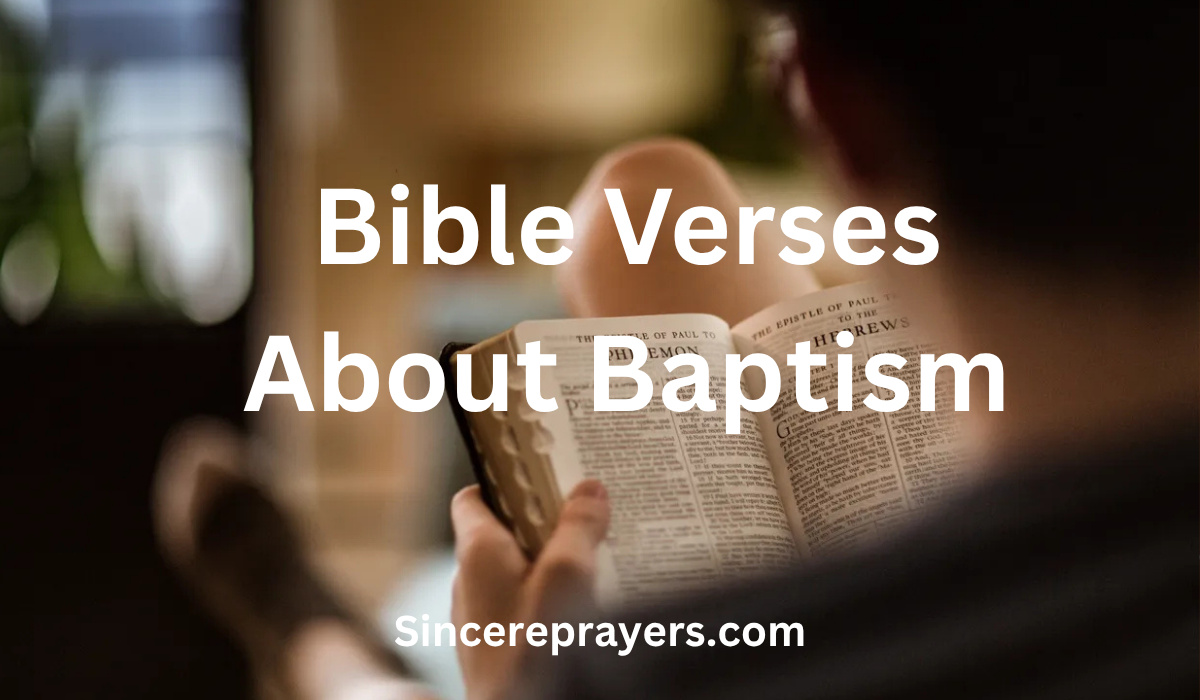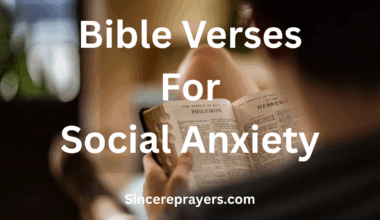One of the most revered and symbolic practices in Christianity is baptism, which is a tangible representation of an internal metamorphosis. It represents a public profession of faith in Jesus Christ as well as purification and renewal. Believers connect with Christ’s death, burial, and resurrection via baptism, which represents the forgiveness of sin and the start of a new life in Him.
These bible verses about baptism has always been a key component of Christian discipleship, from the early teachings of John the Baptist to Jesus’ teachings and the apostolic practice in the New Testament. It is a spiritual experience that symbolizes obedience, repentance, and devotion to the Lord rather than just a ritual. At baptism, the believer testifies, the Spirit renews the heart, and heaven rejoices.

For many, the turning point from belief to action—from belief to public declaration—is baptism. As a reminder that our former selves are buried in Christ and that a new creature rises to walk in His light, the river symbolizes both death and rebirth. This holy deed signifies our acceptance into God’s family and our solidarity with believers everywhere.
We’ll examine what Scripture says about baptism’s meaning, significance, and spiritual depth in this compilation of 35 potent Bible texts. These bible verses about baptism will help you better understand God’s plan to purify, renew, and empower every believer via the waters of baptism, whether you’re getting ready for baptism, thinking back on your own experience, or educating others about this significant symbol of faith.
35 Most Powerful Bible Verses About Baptism in 2025
1. Matthew 3:11
“I baptize you with water for repentance. But after me comes one who is more powerful than I… He will baptize you with the Holy Spirit and fire.”
John the Baptist distinguishes his baptism from the one Christ brings. Water symbolizes repentance, but Jesus baptizes with the Spirit, granting transformation and divine empowerment. This verse reveals that baptism isn’t only about outward washing—it’s about inner renewal through the Holy Spirit, marking a believer’s complete transformation into a new life of faith and power.
2. Acts 2:38
“Repent and be baptized, every one of you, in the name of Jesus Christ for the forgiveness of your sins.”
Peter’s message at Pentecost shows that baptism is an essential step following repentance. It is both a sign and seal of forgiveness, symbolizing a believer’s commitment to Christ. Through baptism, we publicly affirm that we’ve turned away from sin and received God’s grace, stepping into a new covenant relationship sealed by the power of the Holy Spirit.
3. Romans 6:4
“We were therefore buried with him through baptism into death in order that… we too may live a new life.”
Paul explains the deep symbolism of baptism—it mirrors Christ’s burial and resurrection. When believers enter the waters, they identify with His death; when they rise, they embrace His resurrection life. Baptism is not only a declaration of faith but also a spiritual transformation where the old self dies, and a new, Spirit-filled life begins through Christ’s saving work.
4. Mark 16:16
“Whoever believes and is baptized will be saved, but whoever does not believe will be condemned.”
This verse underscores the link between belief and baptism as acts of obedience and faith. Baptism alone doesn’t save—it’s faith in Christ that brings salvation—but baptism is a vital expression of that faith. It represents the believer’s willing submission to God’s command and symbolizes entry into the community of the redeemed, united by shared faith in the risen Lord.
5. Galatians 3:27
“For all of you who were baptized into Christ have clothed yourselves with Christ.”
Paul uses the image of clothing to describe the transformation baptism brings. Through it, believers “put on” Christ, taking on His righteousness, identity, and nature. Baptism represents spiritual adoption—it marks us as God’s children, clothed not in sin or shame but in the grace and glory of the One who redeemed us through His sacrifice.
6. John 3:5
“Jesus answered, ‘Very truly I tell you, no one can enter the kingdom of God unless they are born of water and the Spirit.’”
Jesus teaches Nicodemus that spiritual rebirth requires both water and the Spirit. Baptism symbolizes cleansing from sin, but the Holy Spirit brings regeneration. This verse highlights the dual nature of transformation—outer washing and inner renewal. Through baptism, believers outwardly confess their faith while the Spirit inwardly renews their hearts, granting access to God’s kingdom and a new identity as His children.
7. Acts 22:16
“And now what are you waiting for? Get up, be baptized and wash your sins away, calling on his name.”
Paul’s conversion is marked by this urgent call to baptism. The act represents immediate obedience and symbolizes spiritual cleansing. Baptism is not just a ritual—it’s a declaration of repentance and surrender to Christ. When believers are baptized, they call upon the name of Jesus for forgiveness, rising with renewed purpose and purity to live in alignment with God’s will and grace.
8. 1 Peter 3:21
“And this water symbolizes baptism that now saves you also—not the removal of dirt from the body but the pledge of a clear conscience toward God.”
Peter clarifies that baptism is more than physical cleansing—it’s a spiritual commitment. It signifies an inward transformation, a conscience purified through faith in Christ’s resurrection. Baptism doesn’t save through the act itself, but through what it represents: a renewed relationship with God, the forgiveness of sins, and the confident assurance of salvation through the power of Jesus Christ.
9. Matthew 28:19
“Therefore go and make disciples of all nations, baptizing them in the name of the Father and of the Son and of the Holy Spirit.”
In the Great Commission, Jesus commands His followers to baptize as part of making disciples. Baptism becomes an essential mark of Christian identity, affirming the believer’s relationship with the Triune God. This verse shows that baptism is both a personal commitment and a communal celebration of faith, representing entry into God’s family and alignment with His divine mission in the world.
10. Colossians 2:12
“Having been buried with him in baptism, in which you were also raised with him through your faith in the working of God.”
Paul emphasizes that baptism unites believers with Christ’s death and resurrection. Through it, the old life is buried, and new life emerges by faith in God’s power. Baptism, then, is not just symbolic—it is a declaration of faith that trusts in God’s redemptive work, celebrating the believer’s resurrection to a Spirit-empowered, transformed life rooted in Christ.
11. Luke 3:21-22
“When all the people were being baptized, Jesus was baptized too… and a voice came from heaven: ‘You are my Son, whom I love; with you I am well pleased.’”
Jesus’ baptism marks the beginning of His ministry and affirms His divine sonship. Though sinless, He chose baptism to identify with humanity and model obedience. This moment reveals the Father’s approval and the presence of the Holy Spirit. It teaches believers that baptism is not only about cleansing—it’s also about affirmation, belonging, and receiving divine approval through faith.
12. Acts 8:36-38
“‘Look, here is water. What can stand in the way of my being baptized?’… Then both Philip and the eunuch went down into the water and Philip baptized him.”
The Ethiopian eunuch’s eagerness shows that baptism is a natural response to genuine faith. His immediate action reflects a heart ready to obey. This passage demonstrates that baptism is available to all who believe in Jesus Christ—no background or status can hinder access to God’s grace. It is a joyful moment of confession, faith, and spiritual inclusion into God’s family.
13. Titus 3:5
“He saved us through the washing of rebirth and renewal by the Holy Spirit.”
This verse highlights the divine work of salvation and regeneration. The “washing” refers to the inner cleansing baptism symbolizes, while the Spirit renews the heart. Salvation is not earned by human effort but given through grace. Baptism serves as a visible sign of this inward change, demonstrating that God’s mercy has washed away sin and birthed a new spiritual life through the Holy Spirit.
14. Ephesians 4:5
“One Lord, one faith, one baptism.”
Paul emphasizes unity among believers. Baptism symbolizes this shared identity in Christ—regardless of background or denomination, all believers are united under one faith and one Savior. This verse teaches that baptism is not a divisive act but a unifying declaration of belonging to the same body of Christ, representing spiritual harmony, shared belief, and common purpose among God’s people.
15. John 1:33
“The man on whom you see the Spirit come down and remain is the one who will baptize with the Holy Spirit.”
John the Baptist identifies Jesus as the One who baptizes not just with water but with the Holy Spirit. This distinction shows that while water baptism is symbolic, true transformation comes through the Spirit’s power. The Holy Spirit indwells believers, guiding and empowering them to live in righteousness. Baptism, therefore, points toward a deeper, Spirit-filled life led by divine presence and purpose.
16. 1 Corinthians 12:13
“For we were all baptized by one Spirit so as to form one body.”
This verse underscores spiritual unity. Baptism by the Spirit brings believers together into one body—the Church. Regardless of differences, every Christian shares the same spiritual baptism into Christ’s life and mission. This unity transcends human barriers, reminding us that baptism signifies inclusion, connection, and shared purpose within God’s universal family through the power of the Holy Spirit.
17. Mark 1:4
“John the Baptist appeared in the wilderness, preaching a baptism of repentance for the forgiveness of sins.”
John’s ministry prepared the way for Christ by calling people to repentance. His baptism symbolized a turning point—a cleansing of conscience and readiness for the Messiah. This verse teaches that baptism involves repentance, humility, and transformation. It’s a public declaration that one’s heart has turned from sin toward God, opening the way for the fullness of grace found in Jesus Christ.
18. Psalm 51:7
“Cleanse me with hyssop, and I will be clean; wash me, and I will be whiter than snow.”
David’s prayer expresses the longing for spiritual purification. Though not referring to baptism directly, it foreshadows the cleansing that baptism represents. Through Christ, believers are washed clean from sin and restored to righteousness. This verse captures the heart of baptism—renewal, forgiveness, and transformation—demonstrating God’s power to cleanse completely and restore His people to purity and fellowship with Him.
19. Acts 10:47-48
“‘Surely no one can stand in the way of their being baptized with water. They have received the Holy Spirit just as we have.’”
Peter’s declaration affirms that baptism is open to all who receive the Holy Spirit. This moment with Cornelius’ household broke cultural barriers, showing that salvation and baptism are for everyone who believes. It underscores the inclusiveness of the gospel and that baptism symbolizes unity in Christ, transcending race, status, or background in the shared experience of divine grace.
20. Romans 10:9-10
“If you declare with your mouth, ‘Jesus is Lord,’ and believe in your heart that God raised him from the dead, you will be saved.”
While baptism is the outward expression, salvation begins with inward belief. This verse highlights the necessity of faith before baptism. True baptism flows from confession and belief, symbolizing obedience to Christ’s command. Together, belief and baptism form the full picture of conversion—faith in the heart expressed publicly through the waters of renewal, representing commitment to a lifelong journey with God.
21. Matthew 3:16
“As soon as Jesus was baptized, he went up out of the water. At that moment heaven was opened, and he saw the Spirit of God descending like a dove and alighting on him.”
This powerful moment marks divine approval and the beginning of Christ’s ministry. Jesus’ baptism reveals the unity of the Trinity—Father, Son, and Holy Spirit. It shows that baptism invites the presence of God and symbolizes divine calling. For believers, it’s a sacred step where heaven bears witness, affirming our identity as beloved children of God who walk in His purpose.
22. John 4:1-2
“Now Jesus learned that the Pharisees had heard that he was gaining and baptizing more disciples than John—although in fact it was not Jesus who baptized, but his disciples.”
This passage highlights the continuation of baptism as part of discipleship. Although Jesus Himself did not perform baptisms, His followers did, demonstrating that baptism is a vital part of following Christ. It signifies entry into a new spiritual community centered on faith in Jesus. The act remains a timeless sign of obedience, commitment, and public identification with the Savior’s mission.
23. Acts 9:18
“Immediately, something like scales fell from Saul’s eyes, and he could see again. He got up and was baptized.”
Saul’s baptism follows a miraculous healing and symbolizes spiritual enlightenment. His blindness represented the old life, while baptism marked the beginning of his new life as Paul, the apostle. This verse teaches that baptism is often the natural response to encountering God’s grace. It signifies clarity, forgiveness, and a new direction, turning a once-broken life into a testimony of divine purpose.
24. 1 Corinthians 1:13
“Is Christ divided? Was Paul crucified for you? Were you baptized in the name of Paul?”
Paul rebukes divisions in the Corinthian church, reminding believers that baptism unites them under Christ, not human leaders. The verse emphasizes that baptism’s power comes from Jesus alone. It’s not a sign of loyalty to any person or denomination but a symbol of belonging to the one true Savior who unites all believers under His cross and resurrection.
25. Acts 16:31-33
“They replied, ‘Believe in the Lord Jesus, and you will be saved—you and your household.’… then immediately he and all his household were baptized.”
The Philippian jailer’s response to salvation was immediate baptism for himself and his family. This account shows how faith spreads within households and communities. Baptism becomes both a personal and communal act of faith, expressing joy and obedience to God’s grace. It reminds us that salvation through Christ is for everyone willing to believe and follow Him wholeheartedly.
26. Hebrews 10:22
“Let us draw near to God with a sincere heart and with the full assurance that faith brings, having our hearts sprinkled to cleanse us from a guilty conscience.”
This verse symbolizes the spiritual cleansing baptism represents. Through faith, believers are washed from guilt and set free to approach God confidently. Baptism visually represents this inward transformation—a purified heart and renewed conscience. It’s a call to sincerity and wholehearted devotion, reminding us that God’s grace washes away the stains of sin and draws us nearer to His presence.
27. Isaiah 1:16
“Wash and make yourselves clean. Take your evil deeds out of my sight; stop doing wrong.”
Though written centuries before Christian baptism, Isaiah’s command reflects the heart of repentance. Baptism embodies this cleansing—turning away from sin and embracing righteousness. It is both a washing and a commitment to holy living. This verse calls believers to true repentance that goes beyond the physical act, urging a continual lifestyle of purity, transformation, and moral renewal before God.
28. Acts 19:4-5
“Paul said, ‘John’s baptism was a baptism of repentance. He told the people to believe in the one coming after him, that is, in Jesus.’ On hearing this, they were baptized in the name of the Lord Jesus.”
Here, believers move from John’s baptism to Christ’s, symbolizing spiritual progression. John’s baptism prepared hearts through repentance, but baptism in Jesus’ name completes the process by uniting believers with His saving work. It highlights the importance of faith in Christ as the foundation of true baptism, where the Spirit confirms new life and eternal belonging to the family of God.
29. 1 Corinthians 10:2
“They were all baptized into Moses in the cloud and in the sea.”
Paul compares Israel’s deliverance through the Red Sea to baptism, illustrating deliverance from bondage. Just as the Israelites passed through the waters into freedom, believers pass through baptism into a new covenant of grace. It signifies separation from the past and entry into God’s promises. Baptism, therefore, mirrors spiritual exodus—leaving behind slavery to sin and walking in newness of life.
30. Galatians 2:20
“I have been crucified with Christ and I no longer live, but Christ lives in me.”
Though not directly about baptism, this verse reflects its essence. Baptism symbolizes dying to self and being raised in Christ. The believer’s life becomes Christ’s life, guided by faith and empowered by the Spirit. It’s a continual reminder that baptism is not a one-time event but the beginning of a lifelong journey of surrender, faith, and transformation in Jesus.
31. Romans 8:11
“And if the Spirit of him who raised Jesus from the dead is living in you, he… will also give life to your mortal bodies because of his Spirit who lives in you.”
Baptism represents resurrection power—the same Spirit that raised Christ now lives in believers. Through baptism, we are reminded that eternal life begins now, not just after death. It affirms the believer’s hope in resurrection and renewal. Baptism becomes a proclamation of victory over sin and death, celebrating the indwelling Spirit that sustains and empowers us to live righteously.
32. 2 Corinthians 5:17
“Therefore, if anyone is in Christ, the new creation has come: The old has gone, the new is here!”
Baptism beautifully illustrates this verse. It marks the burial of the old self and the birth of a new creation in Christ. The water symbolizes cleansing, transformation, and rebirth. This passage reminds believers that baptism is not just symbolic—it declares that through faith in Jesus, our past is washed away, and a new Spirit-led life has begun through God’s redeeming grace.
33. Ezekiel 36:25
“I will sprinkle clean water on you, and you will be clean; I will cleanse you from all your impurities and from all your idols.”
This prophetic verse foreshadows the cleansing power of baptism. God promises spiritual purification, removing sin and idolatry from His people’s hearts. Baptism reflects the fulfillment of this promise—symbolizing inner cleansing and restored fellowship with God. It points to His unchanging desire to make His children pure, holy, and devoted to Him through the cleansing power of His Spirit.
34. Philippians 3:10-11
“I want to know Christ—yes, to know the power of his resurrection and participation in his sufferings, becoming like him in his death.”
Paul expresses the heart of baptism—to share in Christ’s death and resurrection. Baptism isn’t just about celebration; it’s about transformation through surrender. It represents dying to sin, enduring trials, and rising to newness of life through resurrection power. Baptism calls every believer to deeper fellowship with Christ, marked by both suffering and victory in the journey of faith.
35. Revelation 7:14
“They have washed their robes and made them white in the blood of the Lamb.”
This heavenly image completes the journey baptism begins. The robes washed in the Lamb’s blood symbolize ultimate purity and redemption. Baptism mirrors this cleansing, pointing to the eternal reality of salvation secured through Christ’s sacrifice. It reminds believers that the cleansing power of Jesus endures forever, preparing the faithful for eternal fellowship in God’s presence, clothed in righteousness and glory.
Conclusion
Baptism is a holy covenant between God and the believer, much more than a ceremonial practice. We publicly profess our faith, die to sin, and rise to walk in newness of life via baptism. It is an expression of obedience to Christ’s command and a response to God’s grace. Baptism confirms that salvation is obtained via faith and the Holy Spirit’s transformative power rather than something that must be earned.
The core of God’s redemptive plan is reiterated in every scripture pertaining to baptism. It serves as a reminder that we are renewed, cleansed, and accepted into His family by the waters of baptism. Believers from all generations and countries are united by baptism because it ties us to the same faith that started with John in the desert and was realized in Christ’s baptism. It is a time when the church witnesses, heaven rejoices, and the believer is transformed permanently.
Every Christian is still called by baptism to live in daily renewal—to be filled with the Spirit, cleansed by the Word, and walking in obedience. It marks the start of a lifetime of sanctification and service, not the conclusion of faith. Baptism serves as a reminder that Jesus, the One who died and rose again for our salvation, is our true owner and that we are no longer our own. We bear the sign of grace that declares, “I am His, and He is mine—forever,” as we live out our baptismal faith.





